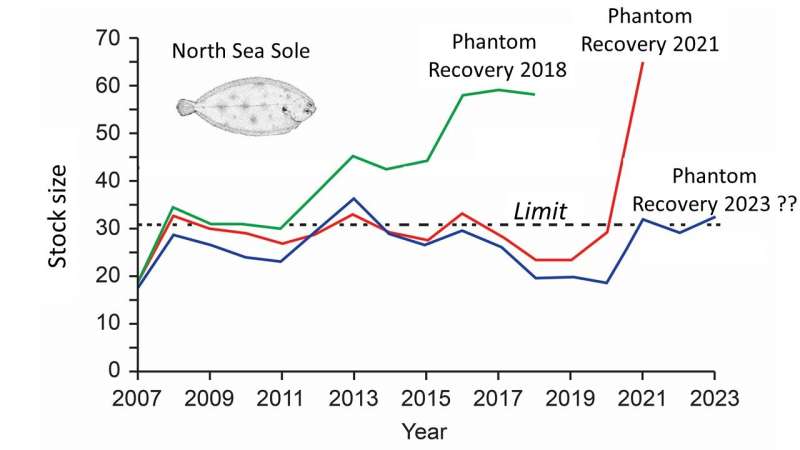This article has been reviewed according to Science X's editorial process and policies. Editors have highlighted the following attributes while ensuring the content's credibility:
fact-checked
peer-reviewed publication
trusted source
proofread
Fisheries research overestimates global fish stocks, say experts

Many fish stocks around the world are either threatened by overfishing or have already collapsed. One of the main reasons for this devastating trend is that policymakers have often ignored the catch limits calculated by scientists, which were intended to be strict thresholds to protect stocks. But it has now become clear that even these scientific recommendations were often too high.
In the European Union (EU), for example, fisheries are primarily managed through allowable catch limits, known as quotas, which are set by the European Council of Agriculture Ministers on the basis of scientific advice and recommendations from the European Commission. A new study by Australian scientists shows that already the scientific advice has been recommending catch limits that were too high.
The journal Science, where the study is published today, asked two of the world's most cited fisheries experts, Dr. Rainer Froese from the GEOMAR Helmholtz Centre for Ocean Research Kiel and Dr. Daniel Pauly from the University of British Columbia, to interpret the findings. In their perspective paper, they advocate for simpler, yet more realistic models based on ecological principles, and call for more conservative stock assessments and management when uncertainties arise.
For the study, Edgar and team analyzed data from 230 fish stocks worldwide and found that stock assessments have often been overly optimistic. They overestimated the abundance of fish and how quickly stocks could recover. Particularly affected are stocks that have already shrunk due to overfishing. The overestimates led to so-called phantom recoveries, where stocks were classified as recovered while, in reality, they continued to decline.
"This resulted in insufficient reductions in catch limits when they were most urgently needed," explains Dr. Froese. "Unfortunately, this is not just a problem of the past. Known overestimates of stock sizes in recent years are still not used to corrected this error in current stock assessments."
The research by Edgar and team also shows that almost a third of stocks classified by the Food and Agriculture Organization (FAO) as "maximally sustainably fished" have instead crossed the threshold into the "overfished" category. Moreover, the number of collapsed stocks (those with less than 10% of their original biomass) within the overfished category is likely to be 85% higher than previously estimated.
But what causes these distortions in stock assessments? Standard stock assessments use models that can include more than 40 different parameters, such as fish life history, catch details, and fishing effort. This large number of parameters makes the assessments unnecessarily complex, write Froese and Pauly. The results can only be reproduced by a few experts with access to the original models, data and settings.
Moreover, many of the required input parameters are unknown or difficult to estimate, leading modelers to use less reliable values that have worked in the past. Froese notes, "Such practices can skew the results towards the modelers' expectations."
The authors therefore call for a revision of current stock assessment models. They advocate simpler, more realistic models based on ecological principles. They also call for greater use of the precautionary principle: when in doubt, conservative estimates should be used to protect stocks.
"In essence, sustainable fishing is simple," says Dr. Froese. "Less fish biomass should be taken than is regrown."
Fish must be allowed to reproduce before they are caught, environmentally friendly fishing gear must be used and protected zones must be established. The functioning of important food chains must be preserved by reducing catches of forage fish such as anchovies, sardines, krill or herring—these are the principles of ecosystem-based sustainable fishing.
Froese adds, "Four of these five principles can be implemented even without knowledge of stock sizes."
More information: Graham J. Edgar et al, Stock assessment models overstate sustainability of the world's fisheries, Science (2024). DOI: 10.1126/science.adl6282. www.science.org/doi/10.1126/science.adl6282
Rainer Froese et al, Taking stock of global fisheries, Science (2024). DOI: 10.1126/science.adr5487. www.science.org/doi/10.1126/science.adr5487
Journal information: Science
Provided by Helmholtz Association of German Research Centres



















